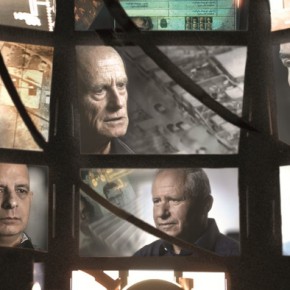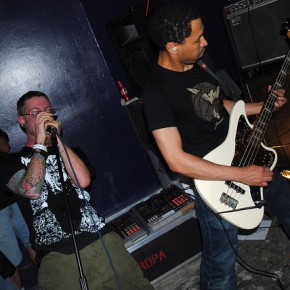When Barack Obama landed in Israel, he pointed out its similarity with the United States. “We stand together because we share a common story — patriots determined ‘to be a free people in our land,’” he said. “Pioneers who forged a nation, heroes who sacrificed to preserve our freedom, and immigrants from every corner of the world who renew constantly our diverse societies.” The less savory parallels weren’t lost on America’s first non-white President.
Those early “patriots” Obama speaks of came to an inhabited land, claimed it for their own, and, over the course of centuries, very nearly wiped out the native population of an entire continent. With slave labor, and the much less-discussed indentured servitude, a prosperous nation was built. It might be fair to say that the United States did offer more opportunity for individuals to rise from poverty and for the creation of a broader middle class over time, as compared to its European counterparts of the late 18th and 19th centuries. But whatever the benefits, the price in blood was very high.
Israelis can at least claim some connection to the land they colonized, and perhaps that makes their history slightly “lighter” than that of the United States. It is surely the case that, while Israel was born in an act of massive ethnic cleansing, this is far eclipsed by the legacy of genocide that nearly emptied the territory of the United States of its native population.
But that makes scant difference to the Palestinians, filling the role of Native Americans in this narrative. The price for the prosperous, dynamic state of Israel that Obama had such praise for was also paid in blood, most of it Palestinian. That is what Obama didn’t just ignore in his speeches; he insulted it.
That history of dispossession and occupation is at the very heart of the Palestinian narrative, just as the ideas Obama referenced are at the heart of the Israeli one. Without understanding and encompassing that Palestinian reality into the politics and diplomacy, both from inside and outside the region, a realistic peace cannot possibly be struck. Can this really be lost on the first African-American US President?
Perhaps it is, but more likely it is simply being willfully ignored. Obama has to do a lot of that. In dancing around the question of Israeli apartheid, Obama, as a black man, had to do it even more. Consider the words to his Jerusalem university student audience: “…only you can determine what kind of democracy you will have. But remember that as you make these decisions, you will define not simply the future of your relationship with the Palestinians — you will define the future of Israel as well. As Ariel Sharon said — I’m quoting him – ‘It is impossible to have a Jewish democratic state, at the same time to control all of Eretz Israel. If we insist on fulfilling the dream in its entirety, we are liable to lose it all.’”

Obama cannot use the “A” word when speaking in Israel, nor when speaking about it anywhere else. But the reference there was clear. Functionally, there is no difference between Obama’s warning to Israel’s youth and Ehud Barak’s admonition to the entire state of Israel: “As long as in this territory west of the Jordan River there is only one political entity called Israel it is going to be either non-Jewish, or non-democratic. If this bloc of millions of Palestinians cannot vote, that will be an apartheid state.”
I once made the argument that using the apartheid label with Israel may be accurate, but it was not helpful. At the time, six years ago, maybe I was right, but these are different days. Israel is not on the road to being an apartheid state, it is one. It is the sovereign of millions of Palestinians who, by virtue of not being Jewish have either second-class citizen status, no say in their national government or, for the majority, no rights whatsoever. That is apartheid, and despite the smoke and mirrors of various administrative systems and propaganda, it can’t be prettied up.
So, Obama issued a veiled message about apartheid to his Israeli audience, but it was couched in effluent praise for Israel’s democracy and entrepreneurial spirit. Political realities make this understandable, albeit still repulsive. But matching Obama’s praise for Israel was the gushing praise in the US, especially from liberal peace groups whose analytical abilities seem to have been given the month off. Where was the criticism of Obama’s acceptance of Benjamin Netanyahu’s framework for returning to talks without pausing settlement expansion? Or of his embarrassing moments with Mahmoud Abbas where the Palestinian president had to insist that settlements are illegal (as the entire world except Israel agrees)? Or at the very least some comment on the absolute absence of any statement of intent to do anything at all to remedy the situation? With a bar set that low by the few groups in the US that are supposed to be working to create political force behind a push for peace, it’s no wonder Obama’s performance is so lacking.
Obama’s gift for oration was on full display both in Jerusalem and Ramallah. To the Palestinians, he affirmed their right to self-determination and to a future free of occupation. Yet he willfully ignored the Israeli siege on Gaza, saying, “…all this stands in stark contrast to the misery and repression that so many Palestinians continue to confront in Gaza — because Hamas refuses to renounce violence; because Hamas cares more about enforcing its own rigid dogmas than allowing Palestinians to live freely; and because too often it focuses on tearing Israel down rather than building Palestine up.”
Hamas’ crimes are well-documented, and there is no reason to absolve them of any of it. The issues there are brought forth by Israeli, Palestinian (in Gaza and in the West Bank) and international human rights groups. But to completely separate the situation in Gaza, as it impacts Gazans, from the Israeli siege when speaking to a Palestinian audience simply ignores reality. Obama’s message was not lost on the Palestinians, many of whom, even in the West Bank, favor Hamas over Fatah: we didn’t allow you to move forward with the government you elected in 2006, and we will not tolerate Hamas in power today any more than we did then.
All of this is put forth by the leader of the world’s only superpower. One might think that as the first non-white man in that office, a legacy of dispossession and occupation culminating in a present day condition of apartheid that, far from grinding down is becoming more entrenched and harsh with each passing day would have special resonance. I have to believe it has that resonance for Obama, but that as president he has to tamp it down. After all, the country he leads has done and been characterized by far worse than what Israel is doing.
Obama made this trip to push the Israel-Palestine conflict out of the way of the other things he wishes to accomplish, in both domestic and foreign policy. I believe he succeeded, at least until new developments in the region overcome his efforts. In order to do that, he highlighted those Israeli roots which hold such similarity to the US. This President, who has repeatedly turned the other cheek to the disrespectful treatment he has gotten from Netanyahu, seems all too practiced at tolerating treatment that other presidents would never have stood for. One supposes that if he can do that, stomaching his country’s support for apartheid isn’t that hard, especially when the deck is massively stacked against his being able to do anything about it.
Photographs courtesy of spark and ISM-NC. Published under a Creative Commons license.





